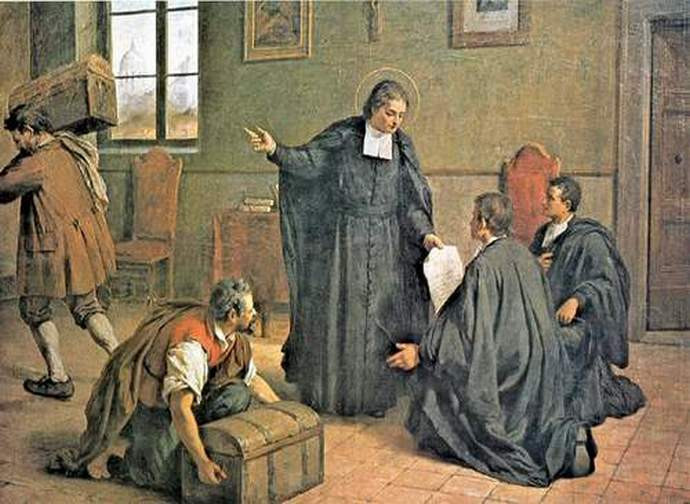Saint John Baptist de La Salle
The educational innovations of Saint John Baptist de La Salle (1651-1719) were so important that he became a giant in the history of pedagogy. It is no coincidence that Pius XII proclaimed him patron saint of educators and teachers.

The educational innovations of Saint John Baptist de La Salle (1651-1719) were so important that he became a giant in the history of pedagogy. It is no coincidence that Pius XII proclaimed him patron saint of educators and teachers, recognising the value of the method that has formed generations of children and young people, beginning with the poor. A method that over the centuries has ensured quality education for students, based on this cornerstone: “Let them pray together and live according to Jesus Christ”.
His faith perfectly complemented his practical spirit. Suffice it to say that this French saint was the first to organise evening and Sunday schools for workers; he devised modern professional teaching, and conceived specific institutes for the moral and cultural preparation of teachers (anticipating today's French Normal Schools).
The first of ten children, born in Reims to a noble family of jurists, John Baptist trained at the Sorbonne and at the famous Seminary of Saint-Sulpice, whose spirituality profoundly influenced him. He was ordained a priest in 1678 and two years later received a doctorate in theology. Meanwhile, in 1679, he had met the layman Adrian Nyel, a Christian benefactor who had already opened some schools for the poor. With the collaboration of Nyel he founded his first free school for the most disadvantaged. Aware of the need to train good teachers, he began to gather young teachers with a religious vocation. These teachers, on May 25, 1684, were formally established in the congregation of the Brothers of the Christian Schools (commonly known as “Lasallians”), the first male religious institute consisting entirely of consecrated lay people, dedicated to carrying out their mission primarily in the classrooms.
Among the novelties of its system was the fact that lessons were held in the classroom (rather than individually) and that priority was given to reading and writing in the vernacular, postponing the study of Latin. The idea was to provide free basic education for children of the working classes, with exercises and concepts suitable for entering the world of work. He made the premise of everything the teaching of the Catechism for half an hour a day, because he considered it indispensable to teach the students the Christian virtues. His message to his disciples was clear: “You are the successors of the apostles in their mission to catechise and educate the poor; if you want your ministry to be useful for the Church, you must teach your pupils the Catechism every day, presenting the fundamental truths of our religion, following the example of the apostles, which is that of Jesus Christ Himself, who dedicated Himself every day to this mission”.
He himself wrote a catechetical work with questions and answers, a book of etiquette, an Office of the Virgin Mary for Christian Schools, and so on. His was an incarnate faith, naturally aimed at embracing education. That is why he scheduled the school day to include different Christian practices: Mass, Rosary, prayers before and after class. He was certain that entrustment to God was a basic principle for the righteous nurture of children. “Infuse the pupils with a prayerful attitude in church. Instil in them the simplicity and humility that Our Lord recommends in the Gospel; make them acquire gentleness, patience, love and respect for their parents”. It seems the exact opposite of what secularism dictates today. This was a true programme of virtue, with a teaching quality to be envied and a charism that made Lasallian schools spread across five continents. He taught: “It is a good moral rule not to distinguish between the interests proper to our profession and those of our salvation”.
Patron of: teachers, educators
Read more: Meditations by Saint John Baptist de La Salle




